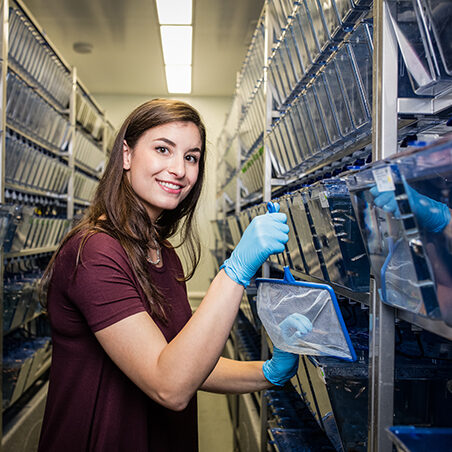Jaime Wertman
Clinical Surveillor/Post Doctoral Fellow, IWK Health Centre/Dalhousie University
Bachelor of Science (Hons.), Biology, 2012
My writing skills improved at King’s and that has been a huge advantage for me in my work in science.
In her last year of high school, as Jaime Wertman weighed her options as to which university to attend, high on her list was “a small university experience.”
“I wanted to have a sense of community,” Jaime says. “At the same time, I was very academically inclined, and wanted to be with other students who felt that way, students who really wanted to be there.”
While still in high school, Jaime, an award-winning science student, had already been putting a great deal of thought and effort into what her career might be. This effort included enrolling in the International Baccalaureate program, in which she took a course called Theory of Knowledge. There she was introduced to epistemology—a type of philosophy focused on the nature of knowledge. The course played a big role in her decision to take the Foundation Year Program (FYP) at King’s.
Initially, Jaime’s plan was to do FYP and then go somewhere else, but that all changed when she “fell in love with the place” and decided to stay.
Enrolling at King’s to do a BA, part-way through her second year Jaime switched to a Combined Honours in Biology and Early Modern Studies (EMSP). Her decision came late and the courses she wanted to take in science were full. Surveying her remaining options, she enrolled in a class on cell biology. The class was known to be challenging, although Jaime says she did not realize this at the time. As it turned out, she loved it.
“I love cell biology and, in some ways, it’s still part of what I do today. I did really well in that course, really enjoyed it, and the experience made me think, ‘Maybe I should do some science.'”
Jaime ultimately graduated with a BSc in Biology. Today she is a clinical surveillor for a national network that looks at adverse drug reactions, working at the forefront of what has come to be known in recent years as personalized medicine. Her current focus is pediatric oncology, which sees her working out of the IWK Health Centre in Halifax. Jaime works to predict what genetic features patients have that may make them more or less likely to react adversely to a drug. This information is then shared with a patient’s oncologist in the hope of identifying the best possible treatment plan for that patient.
Cells aren’t the only structures Jaime learned about during her BSc. She also became a capable writer—something she says helps a lot as a scientist. Noting that she is writing a grant proposal at the moment, Jaime says “Writing is very important in science, but a lot of scientists are not great at it. That’s not an offensive remark as a lot of scientists would volunteer that information. But knowing how to write means you are not spending time thinking about elements like flow and structure, or searching for the right word. My writing skills improved at King’s and that has been a huge advantage for me in my work in science.”
Asked if there is a text from FYP that has stayed with her she is quick to answer.
“Oh, T.S. Eliot. We read The Waste Land. I love all of T.S. Eliot but The Waste Land was the one that really stuck with me. It’s such a profound exploration of purgatory, of being stuck in limbo, paralyzed by indecision. I often think about The Waste Land, there are lines I can recite, and it all reminds me of how fortunate humans are to have the choices we have and to be able to make decisions. I’m a very decisive person, not one to waffle, so maybe that’s why The Waste Land speaks to me as it does.”
